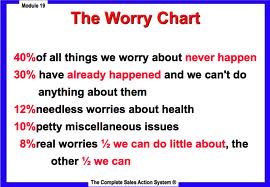Your thoughts are just that. 
They belong to you and you’re the one who has sovereign control over them. No one makes you think what you think nor can anyone control what you think.
The problem with thoughts is that they’re the seeds from which words grow. Your words create your actions, which create your character which creates your destiny.
Do your thoughts divide or pull your mind to pieces?
-
- Are your thoughts filled with the cares of life?
- Do they torment you?
- Do your thoughts rush about or do they freeze in suspense as you worry about circumstances?
- Do they disturb your joy, break up your sleep or hinder you from enjoying your family and friends?
If you answered yes to the above then you might be suffering from the effects of being a worrier.
A worrier is a person who thinks about unfortunate things that might happen.
A chronic worrier is full of what-ifs? and worst-case scenarios.
This takes a heavy toll on your emotions and turns you into a nervous wreck.
The good news is that it’s a mental habit that can be broken.
There are things that we should be concerned about in our lives and this is normal.
Worry can be helpful if it spurs you to take action or solve a problem.
Some folk are the exact opposite of a worrier being happy-go-lucky or carefree – cheerfully irresponsible.
The best path to follow would be somewhere in between.
Worry means that you’re concerned, anxious, troubled or uneasy about something.
That in itself isn’t a problem but when a thought like did I leave the iron on? escalates to your house being burnt down with you being imprisoned for arson, then it’s a problem.
So why do you worry?
You believe that:
-
- you might find a solution
- you will avoid bad things from happening
- you’re prepared for the worst
- you can prevent unpleasant surprises
- you’re responsible
Worrying is a tough habit to break because of the underlying reasons behind it.
I’m no expert on the matter so I refer you to What? Me Worry!?! to help you understand the habit and suggestions on how to break it.
A warrior is someone who is engaged or experienced in warfare.
The image that a warrior creates is one who is trained, disciplined, fearless and focused.
Every day you’re engaged in some form of mental warfare.
You’re faced with failure or success, right or wrong and a myriad of decisions that have to be made.
A warrior:
-
- Accepts uncertainty.
- You can’t be 100% certain about anything in life
- You cannot predict the future
- The chances of worst-case scenario happening are low
- There is no immediate accurate answer
- Postpones anxious thoughts.
Don’t be paralysed by anxious thoughts. Put them off till later when you can rationally deal with them. - Challenges negative thoughts.
- You confront your disturbing thought and define your fears
- You check for evidence of truth, probability of it happening, likely outcomes and what would you say to a friend who had this worry.
- Knows how to relax.
Anxious thoughts produce tension in the body as it prepares for fight or flight.
A warrior knows this and takes time out to relax physically and mentally before allowing a thought to escalate out of control. - Takes care of themselves.
You tend to eat more/less, use stimulants such as alcohol/nicotine/caffeine/sugar to help you cope, sleep less and withdraw when you are faced with worries.
Make sure you avoid these traps and the cycle of tension they encourage.
- Accepts uncertainty.
Being a worrier is easy. Life is hard, dying is easy.
Take the route of being a warrior and fight the good fight.
Stand tall and defeat the invaders from the land of “what if?”
It’s your choice.
I’ve seen many troubles in my time, only half of which ever came true.
Mark Twain
Updated: April 2022
